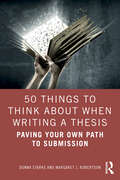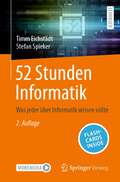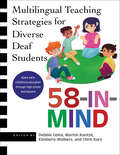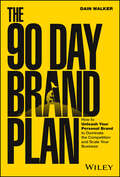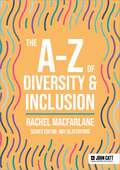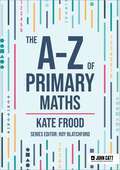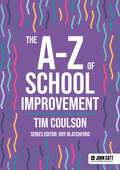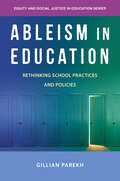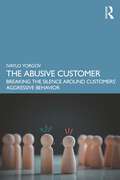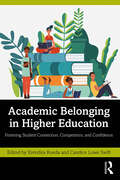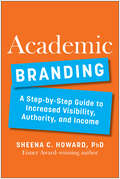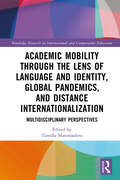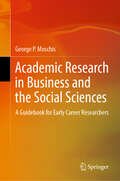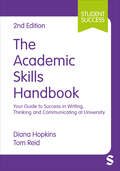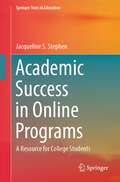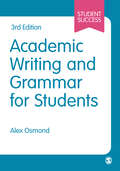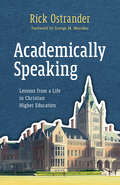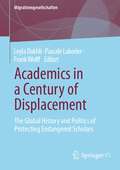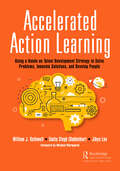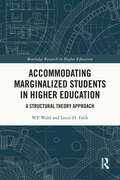- Table View
- List View
50 Things to Think About When Writing a Thesis: Paving Your Own Path to Submission
by Donna Starks Margaret J. RobertsonMoving away from a traditional ‘one size fits all’ approach, this thesis guide encourages readers to find their own path to submission, demonstrating that the process of writing is as unique as the individual candidate. This book shows thesis writers how to embrace the individual nature of writing, bringing their own unique identities and skillsets to their thesis. Each idea is presented as one that has multiple solutions, depending on who the readers are and what they want to achieve. The book guides the reader on identifying their own ways of working, their own particular strengths, as well as their unique voice and how to use these as tools to navigate the process of writing and surviving the thesis. It also provides practical guidance on elements such as the literature review and methodology, considerations around language and how to deal with life after submission. Offering a unique perspective on the process and experience of completing a thesis, this book will be an essential companion for students completing a thesis at Honors, Master's or PhD level.
52 Stunden Informatik: Was jeder über Informatik wissen sollte
by Timm Eichstädt Stefan SpiekerHaben Sie in Ihrer Schulzeit keinen oder nur mangelhaften Informatikunterricht erhalten? Haben Sie Kinder und würden diese gerne auf das bevorstehende Informationszeitalter vorbereiten? Nehmen Sie sich in den nächsten 52 Wochen je eine Stunde Zeit um mithilfe dieses Buches ein solides Grundwissen über Informatik zu schaffen! 52 Stunden Informatik enthält eine breit gefächerte Zusammenstellung von Lektionen, zum Lernen bzw. Lehren von Grundwissen der Informatik. Vom Nutzen des Internets bis hin zur Informationssicherheit, von deskriptiver Statistik bis hin zum neuronalen Netz sind viele wichtige Aspekte der Informatik abgedeckt. Alle Lektionen enthalten pädagogisch wertvolle Hinweise und sind mit praktischen Übungen versehen. Eine Pflichtlektüre für alle praxisorientierten Informatiklehrer*innen und Eltern, die selbst einen angemessenen Informatikunterricht verpasst haben. Die neue Auflage aktualisiert und erweitert viele Kapitel (z.B. ist das Thema "ChatGPT" im Kapitel über künstliche Intelligenz mit aufgenommen) und enthält ein neues Kapitel über 3D-Druck.
58-IN-MIND: Multilingual Teaching Strategies for Diverse Deaf Students
by Debbie Golos; Marlon Kuntze; Kimberly Wolbers; Chris KurzA highly practical and engaging resource for current and future teachers, 58-IN-MIND describes and demonstrates theoretically-driven, research-based, and classroom-tested best practices for using American Sign Language and English in instruction across the curriculum. The multilingual and multimodal instructional strategies presented here are embedded in approaches that aid learning and foster well-being. This book will support teachers in creating meaningful educational experiences for Deaf students in all grades, from early childhood education through high school. Each chapter is written by a team of researchers and P–12 teachers with at least one Deaf coauthor. With seventy-five percent of the authors being Deaf, this is the first teaching methods book to harness the expertise of Deaf professionals at this level, highlighting their vital role in Deaf education and in shaping inclusive and effective learning environments. This book meets the need for a resource that recognizes the diversity of Deaf students by creating space in the classroom to honor their home/heritage languages, cultures, races, genders, abilities, hearing levels, and other multiple and intersecting identities. Written in a conversational tone, the book includes core recommendations for instruction of the targeted subject area, examples of key strategies, lessons and real stories from those working in the field, suggestions for practice, and recommended resources. “58-IN-MIND” in the title refers to the version of the ASL sign "stick" that is made on the forehead, which is equivalent to the English idiom “to stick in one's mind.” As in, when students learn in a culturally responsive manner, the learning is likely to stick. The title also alludes indirectly to the collective aspirations of the chapter authors that the practices discussed in the book will also stick in the readers’ minds, and thus have a transformative impact on the way Deaf students are taught.
The 90 Day Brand Plan: How to Unleash Your Personal Brand to Dominate the Competition and Scale Your Business
by Dain WalkerBecome a known name and authority in your field to unlock infinite money-making opportunities In The 90 Day Brand Plan: A Step-by-Step Guide to Mastering the Art of Branding, celebrated branding agency founder and influencer Dain Walker delivers an expert roadmap to harnessing your authority, credibility, and skills in your field to create consistent money-making opportunities. In the book, you’ll learn how to get paid for being a known name in your industry through your businesses, products, and services. Discover how to nail and scale your likeability, charisma, and character as you channel your personal brand’s attention into whatever company or product you’re building. The author explains how he used his own personal Instagram following to grow multi-million-dollar brands, and how you can do the same thing. You’ll also find: Strategies to use your creativity, sales abilities, action plans, and fun daily mental exercises to create the right mindset and skillset for growth Ways to eliminate fear, rejection, and self-doubt as you learn to unpack personal belief into the creation of content of all sorts Techniques to harness a variety of income streams, including those from social media, speaking, selling, podcasting, marketing, pitching, and advertising An effective and insightful guide to harnessing the full potential of your personal credibility, expertise, and authority, The 90 Day Brand Plan will prove invaluable to influencers, promoters, marketers, entrepreneurs, and founders of all stripes.
The A-Z of Diversity & Inclusion (John Catt A-Z series)
by Rachel MacfarlaneThe A-Z of Diversity and Inclusion is a powerful blend of advice, reflection and provocation on these vital topics, organised around the 26 letters of the English alphabet.Great educators recognise how diversity enriches their organisation. They have an ambition for every learner (adult and child) to be seen, represented and included, for their needs to be met and any barriers they are experiencing to be understood, tackled and overcome. To achieve this requires dogged determination, relentless and forensic focus and unwavering optimism and energy.Inclusive educators quite literally change lives.
The A-Z of Diversity & Inclusion (John Catt A-Z series)
by Rachel MacfarlaneThe A-Z of Diversity and Inclusion is a powerful blend of advice, reflection and provocation on these vital topics, organised around the 26 letters of the English alphabet.Great educators recognise how diversity enriches their organisation. They have an ambition for every learner (adult and child) to be seen, represented and included, for their needs to be met and any barriers they are experiencing to be understood, tackled and overcome. To achieve this requires dogged determination, relentless and forensic focus and unwavering optimism and energy.Inclusive educators quite literally change lives.
The A-Z of Primary Maths (John Catt A-Z series)
by Kate FroodThe A-Z of Primary Maths is a compendium of great ideas for teaching mathematics, organised around the 26 letters of the English alphabet.'Maths foundations must be built in our primary schools. We need to create space for children to play with numbers, to explore patterns, to solve problems, and to laugh and chat in maths lessons. It's this start that will build a lifelong love of and confidence in maths' - Kate Frood.
The A-Z of Primary Maths (John Catt A-Z series)
by Kate FroodThe A-Z of Primary Maths is a compendium of great ideas for teaching mathematics, organised around the 26 letters of the English alphabet.'Maths foundations must be built in our primary schools. We need to create space for children to play with numbers, to explore patterns, to solve problems, and to laugh and chat in maths lessons. It's this start that will build a lifelong love of and confidence in maths' - Kate Frood.
The A-Z of School Improvement (John Catt A-Z series)
by Tim CoulsonThe A - Z of School Improvement is an authoritative 'can-do' guide to all aspects of improving schools, organised around the 26 letters of the English alphabet.School improvement is about getting every detail right. The serious school leader pays attention to every aspect of school life and focuses on improving it and aiming for excellence.One of the marks of the successful school leader is a forensic attention to detail. They will look closely and carefully at every aspect of a particular issue, analyse data, and only agree on interpretations after much consideration. While much of a school leader's work is relational, motivational, and relentless, bringing a forensic mindset to bear ensures that actions towards improvement are focused and thoughtful.
The A-Z of School Improvement (John Catt A-Z series)
by Tim CoulsonThe A - Z of School Improvement is an authoritative 'can-do' guide to all aspects of improving schools, organised around the 26 letters of the English alphabet.School improvement is about getting every detail right. The serious school leader pays attention to every aspect of school life and focuses on improving it and aiming for excellence.One of the marks of the successful school leader is a forensic attention to detail. They will look closely and carefully at every aspect of a particular issue, analyse data, and only agree on interpretations after much consideration. While much of a school leader's work is relational, motivational, and relentless, bringing a forensic mindset to bear ensures that actions towards improvement are focused and thoughtful.
Ableism in Education: Rethinking School Practices and Policies (Equity and Social Justice in Education Series)
by Gillian ParekhHow we organize children by ability in schools is often rooted in ableism.Ability is so central to schooling—where we explicitly and continuously shape, assess, measure, and report on students’ abilities—that ability-based decisions often appear logical and natural. However, how schools respond to ability results in very real, lifelong social and economic consequences. Special education and academic streaming (or tracking) are two of the most prominent ability-based strategies public schools use to organize student learning. Both have had a long and complicated relationship with gender, race, and class.In this down-to-earth guide, Dr. Gillian Parekh unpacks the realities of how ability and disability play out within schooling, including insights from students, teachers, and administrators about the barriers faced by students on the basis of ability. From the challenges with ability testing to gifted programs to the disability rights movement, Parekh shows how ableism is inextricably linked to other forms of bias. Her book is a powerful tool for educators committed to justice-seeking practices in schools.
The Abusive Customer: Breaking the Silence Around Customers’ Aggressive Behavior
by Ivaylo YorgovBreaking the silence around an all-too-common problem, this book offers insights into the triggers of customer aggression against service employees, explores its consequences, and provides practical advice for handling abusive customers and mitigating the damage they inflict. Today, more than half of the world’s population is employed in the service sector. This fundamental economic shift is accompanied by heightened attention to customer service and the ‘customer is always right’ paradigm. But when customers act aggressively, everyone pays a price: frontline employees, their families, their companies, and even the abusive customers themselves. Unlike breezier titles on the subject, this book is based in academic research—exploring the ‘why?’ and ‘when?’ behind abusive behavior—that underpins its practical approach, illustrated with real-world stories from professionals on the front lines of customer service. The book’s useful tools include a sample anti-customer abuse policy and management process, a cheat sheet of practices that work for handling its consequences, a summary of effective service recovery processes and practices, and abuse-handling training list and curriculum templates. Managers and workers in customer-facing roles, in industries such as retail, hospitality, tourism, banking, and contact centers, will welcome this essential resource as part of their efforts to stop aggressive customer behavior, and improve employee morale, job satisfaction, and engagement.
Academic Belonging in Higher Education: Fostering Student Connection, Competence, and Confidence
by Eréndira Rueda Candice Lowe SwiftThe concept of belonging has been increasingly understood as the missing piece in diversity, equity, and inclusion efforts in higher education. This book explores the need to recognize and account for institutional-level factors that shape academic belonging, thereby improving student experience and outcomes. Though recent scholarship has identified several factors that are associated with student belonging in academics, there is little research that addresses what faculty can do in concrete terms to promote belonging, particularly in the domains where they have the most influence. The 12 chapters in this volume introduce readers to an array of collaborative, cutting-edge efforts to develop pedagogies, programs, strategies, and environments that help students develop academic belonging; that is, a sense of connection, competence, and confidence in academic domains. This book is written for higher education faculty, administrators, and researchers who wish to enhance their students’ sense of academic belonging by taking informed, practical measures to make them feel valued and supported.
Academic Branding: A Step-by-Step Guide to Increased Visibility, Authority, and Income
by Sheena HowardBecome a thought leader in your postgraduate field—and make money while doing so, with this step-by-step guide from an academic who has been there.Academic Branding gives academics and scholars the tools and strategies they need to position themselves outside of academia so they can reach the masses and make an impact—without the expense of a publicist. With the practices in this book, readers will build a powerful brand, become a public intellectual, and grow their audience with guidance from Sheena C. Howard, PhD. She&’s been where you are now, and she&’s ready to help you grow beyond what you imagine. With Dr. Howard&’s unique and thorough approach to success in the age of social media, you&’ll learn how to:Reframe the way you think about self-promotionIdentify your brand archetype and create a brand statementReach an audience beyond academia Build multiple revenue streamsGet your ideas (and content) to spreadCreate a movement around your expertise Land major media spots and speaking engagements In a world where anyone who is savvy online can turn themselves into a subject matter expert, it&’s important that we lift up and amplify the voices of actual subject matter experts. This guide will teach you how to reach the audience that needs your expertise most, building a brand and achieving financial freedom along the way.
Academic Mobility through the Lens of Language and Identity, Global Pandemics, and Distance Internationalization: Multidisciplinary Perspectives (Routledge Research in International and Comparative Education)
by Tamilla MammadovaThis book takes a critical perspective on international academic mobility and contextualizes this mobility through different key factors including global pandemics, identity construction, intercultural sensitivity, and cultural engagement. Using a multidisciplinary approach, the volume investigates the current trends of international mobility programs with consideration to the new normal through social, political, economic, and educational factors among mobility exchange actors. Contesting established approaches to international academic mobility in paradigmatic contexts, the volume investigates the effects and implications of distance internationalization as an emerging concept, juxtaposing the traditional context of academic mobility with a newly emerging virtual one as a key catalyst for change. Offering a range of authentic studies, reviews, and cases to challenge international global education, this timely book will appeal to researchers, scholars, and postgraduate students in the fields of higher education research, international and comparative education, and the sociology of education more broadly.
Academic Research in Business and the Social Sciences: A Guidebook for Early Career Researchers
by George P. MoschisThis book provides doctoral students, junior faculty and early-career researchers with guidelines, resources and strategies for performing and publishing academic research successfully. It helps increase the productivity of researchers by showing efficient and effective ways to increase research output and publication probability, ranging from manuscript preparation and positioning to working with co-authors and journal reviewers. The author uses research findings, anecdotal evidence and illustrations from his academic career to support his views on strategies and tactics that are required of scholars in order to succeed.
The Academic Skills Handbook: Your Guide to Success in Writing, Thinking and Communicating at University (Student Success)
by Diana Hopkins Tom ReidThis is your complete guide to success in navigating, writing, thinking, and communicating at university. Packed with tips, diagnostic tools, guided exercises, and full text examples, it equips you to boost your grades, ace your assignments, and get the most out of your time at university. This book helps you: Prepare for and navigate university culture Develop the academic skills needed for success at university Communicate your ideas with confidence and clarity Watch your skills grow with diagnostic tools Create your own study plan tailored to the skills you need Know what your tutor is looking for and how to deliver Turn your skills into success after university The Academic Skills Handbook is specially designed to show you where your strengths are and what you need to work on, so you get a practice plan that is perfect for your needs. It then arms you with the principles and practice to get ahead in your academic writing, presentations and group work. What′s new to this edition? Three chapters on university culture, writing blogs, and online and blended learning (including best practices for using AI as a support tool), as well as new annotated examples of course work and increased coverage of wellbeing. Student Success is a series of essential guides for students of all levels. From how to think critically and write great essays to boosting your employability and managing your wellbeing, the Student Success series helps you study smarter and get the best from your time at university.
The Academic Skills Handbook: Your Guide to Success in Writing, Thinking and Communicating at University (Student Success)
by Diana Hopkins Tom ReidThis is your complete guide to success in navigating, writing, thinking, and communicating at university. Packed with tips, diagnostic tools, guided exercises, and full text examples, it equips you to boost your grades, ace your assignments, and get the most out of your time at university. This book helps you: Prepare for and navigate university culture Develop the academic skills needed for success at university Communicate your ideas with confidence and clarity Watch your skills grow with diagnostic tools Create your own study plan tailored to the skills you need Know what your tutor is looking for and how to deliver Turn your skills into success after university The Academic Skills Handbook is specially designed to show you where your strengths are and what you need to work on, so you get a practice plan that is perfect for your needs. It then arms you with the principles and practice to get ahead in your academic writing, presentations and group work. What′s new to this edition? Three chapters on university culture, writing blogs, and online and blended learning (including best practices for using AI as a support tool), as well as new annotated examples of course work and increased coverage of wellbeing. Student Success is a series of essential guides for students of all levels. From how to think critically and write great essays to boosting your employability and managing your wellbeing, the Student Success series helps you study smarter and get the best from your time at university.
Academic Success in Online Programs: A Resource for College Students (Springer Texts in Education)
by Jacqueline S. StephenThis book provides higher education students with a comprehensive resource to assist them in their academic persistence in an online course or program. It addresses a wide selection of topics emphasizing a myriad of factors that impact a student’s persistence, and ultimate success, in an online program or course. The book helps students to gain insight into the skills, knowledge, and attributes needed to succeed in the autonomous nature of an online learning environment. Thus, this book helps students to proactively engage in activities to prepare for online learning. Information presented in each chapter is drawn from theory and recent research centered on persistence of online students in higher education. It incorporates hands-on practical activities to promote application of theory and research, and encourages students to demonstrate their knowledge, skills, and abilities through the use of reflective and thought-provoking activities. Hence, this book provides online students with an up-to-date resource they can use to develop an awareness of their readiness and preparedness for online learning. Additionally, this book equips students with information and strategies aimed at helping them to address gaps in their skills and knowledge that may present them with barriers to academic success. The content of this book is aligned with widely used student learning outcomes and objectives of first-year student seminar courses and orientation programs for graduate and undergraduate students enrolled in online programs. Furthermore, it is deliberately organized and structured to support an online student’s academic journey as they navigate the online learning environment. As such, these features make it an ideal book for use by students, instructors, and academic advisors or college and university academic support staff.
Academic Writing and Grammar for Students (Student Success)
by Alex OsmondFrom grammar and punctuation, to proofreading and fixing mistakes, this is your one-stop guide to improving your academic writing to achieve better grades at university. Including quotes from tutors and examples of good and bad practice, this book provides step-by-step guidance on Basic conventions of academic writing Critical thinking Conciseness and clarity Proofreading and referencing Common mistakes and how to avoid them. Student Success is a series of essential guides for students of all levels. From how to think critically and write great essays to boosting your employability and managing your wellbeing, the Student Success series helps you study smarter and get the best from your time at university.
Academic Writing and Grammar for Students (Student Success)
by Alex OsmondFrom grammar and punctuation, to proofreading and fixing mistakes, this is your one-stop guide to improving your academic writing to achieve better grades at university. Including quotes from tutors and examples of good and bad practice, this book provides step-by-step guidance on Basic conventions of academic writing Critical thinking Conciseness and clarity Proofreading and referencing Common mistakes and how to avoid them. Student Success is a series of essential guides for students of all levels. From how to think critically and write great essays to boosting your employability and managing your wellbeing, the Student Success series helps you study smarter and get the best from your time at university.
Academically Speaking: Lessons from a Life in Christian Higher Education
by Rick OstranderA personal odyssey through the world of Christian higher education, narrated by a professional who has worked on both sides of the faculty-administrative divide. What is the world of Christian higher education really like? Rick Ostrander&’s thirty-year career in Christian academia equips him to provide an insider&’s perspective on the field and its future. Ostrander cut his teeth as an undergraduate at Moody Bible Institute and the University of Michigan before completing his PhD with George Marsden at Notre Dame. From there he worked as a professor and administrator at various Christian colleges, a vice president at the Council for Christian Colleges and Universities, and an independent academic consultant. Throughout, he witnessed the many dramatic transformations of Christian higher education. Ostrander traces an attempt to cultivate evangelical intellectualism in the &’90s to the political and economic forces that shake Christian colleges today. Through lively storytelling, Ostrander highlights the qualities and quirks of Christian higher education. His experiences offer readers insight into how Christian colleges can flourish in an age of uncertainty.
Academics in a Century of Displacement: The Global History and Politics of Protecting Endangered Scholars (Migrationsgesellschaften)
by Leyla Dakhli Pascale Laborier Frank Wolff‘Endangered scholars’ is a recently highly relevant, yet historical notion. Embedded in the greater history of the 20th and 21st centuries, it captures the phenomenon of scholars who, after years of intellectual work and integration in their societies of origin, are forced to seek rescue in foreign host societies. The pressing urgency of the topic thus has an important historical background. From escaping Russian intellectuals after 1917 to the protection of Jewish refugees during World War II, Algerian intellectuals in contemporary history, or persecuted academics from Turkey today: Over the course of about a century, categories of inclusion, transnational relations, and forms of agency of scholars at risk remained surprisingly stable (and hence diachronously and synchronously comparable) while they also adjusted flexibly to contemporary conditions. This collective volume carves out this historical development and its recent expressions. It brings together researchers in a vivid yet largely unconnected field of migration and refugee studies. By developing a complex image of the origin of the global history and politics of protecting endangered scholars from the early 20th century until today, the book contributes to research on academics in exile as a part of refugee research, migration studies, the history of higher education, and the contemporary history of societies. The interdisciplinary volume explores the phenomenon as a historical, political and legal subject, brings together scholars of forced migration and intellectual studies, and includes currently affected scholars into those reflections.
Accelerated Action Learning: Using a Hands-on Talent Development Strategy to Solve Problems, Innovate Solutions, and Develop People
by William J. Rothwell Smita Singh (Dabholkar) Jihye LeeIn a knowledge-based society, people should not simply collect knowledge but should utilize and apply it to solve a problem. Action learning makes organizational members learn while solving real problems in the workplace. However, traditional action learning might not be effective for rapidly changing environments, because it is typically a process that requires substantial time. Therefore, this book provides a guideline on how to apply action learning quickly in workplaces—especially in virtual settings. Action learning allows the organization to develop people while, at the same time, getting work done. It is an alternative to classroom-based and online learning programs. In addition, it can also be an alternative to the instructional systems design (ISD) model or the successive approximation model (SAM) as a means of developing planned instruction if used for that purpose. Action learning can be an effective tool for Web 2.0 learning. Many organizations are now using self-directed teams and other team formats for work. It makes sense to revisit planned on-the-job training and learning with an emphasis on teams. Action learning is a process involving a small group with facilitators and action-learning process managers, so it is one of the best options for team-based problem-solving. This book provides real action learning cases. There are needs that have emerged in these post-pandemic times. There is a need to explain how action learning can be applied to various settings, issues, and challenges. Since COVID-19 occurred, many people must work in virtual or hybrid settings. This book gives trainers—who could be HR managers, operating managers, or learning and development professionals—guidelines that can be used in virtual settings to meet the new needs. Essentially, this book is written for team facilitators, supervisors, managers, or team members who wish to plan action-oriented, problem-based, and work-related learning experiences in real time. Because many action-learning books are written for an academic audience, it is not easy to put action learning into practice. Therefore, the goal of this book is to provide guidelines on how action learning starts, what basic principles should be considered, and what tools and techniques are needed for rapid action learning. The book is intended to be a primer on how to facilitate a planned learning project in a team or workgroup.
Accommodating Marginalized Students in Higher Education: A Structural Theory Approach (Routledge Research in Higher Education)
by WP Wahl Louis H. FalikThis book defines and examines the needs of the marginalized student and presents a theoretically grounded model to guide institutions of higher education toward developing new and more effective programmatic responses. Taking the implementational experience of the University of the Free State (UFS) in Bloemfontein, South Africa, as a case study, it investigates the experience of students who present problems of learning and inadequate preparation for sustained performance, including learning disabilities, lack of study skills, motivational factors, and cultural support systems. Further, it identifies the pressure for institutions to be responsive to social and political pressures to accommodate the needs of students previously excluded from participation in higher educational or vocational training opportunities. In addressing this timely area of development, the authors formulate a unique conceptual foundation for the consideration of a new paradigm, based on cognitive and biosocial theories: those of the theory of structural cognitive modifiability and mediated learning experience and of Feuerstein and Bronfenbrenner’s ecosystem structural orientation. Innovative, applicational, and optimistic in nature, this book will appeal to scholars, researchers, administrators, and postgraduate level students working across the fields of higher education, educational psychology, and student counseling.
